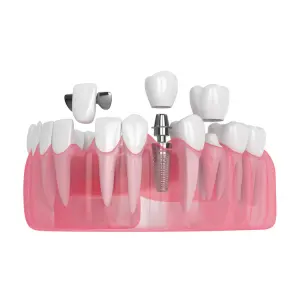
Patient Info
Dental Implants
Cosmetic Dentistry
General Dentistry
Tooth loss can significantly impact your ability to eat and speak normally. Fortunately, restorative dentistry offers solutions like implants, bridges, or dentures to replace missing teeth. Among these options, dental implants emerge as a permanent, convenient solution that closely resembles natural teeth. But what is the Success Rate of Dental Implants?
However, deciding on dental implant surgery entails careful consideration due to the upfront cost and lengthy treatment process. Understanding the success rate of dental implants becomes crucial in making informed decisions about oral health treatments.
In this blog, we delve into the factors influencing the success rate of dental implants, providing valuable insights into their reliability and effectiveness. Join us as we explore the world of dental implants and uncover the keys to their success.
The average dental implant success rate is around 94% after 15 years. However, specific factors contribute to the dental implant success rate, including implant diameter and length, periodontal health, general health, and the patient's age.
Several factors play an important role in determining the success rate of dental implants, ranging from the type of implant utilized to its placement location. When engaging in discussions regarding dental implant surgery and success rates with your dentist, it's important to consider the following:
The diameter of the implant post significantly impacts overall success rates. Studies indicate that dental implants with a smaller post diameter (<3mm) are more prone to failure, whereas those with a larger post diameter (>4mm) tend to have higher success rates.
The quality of the bone where the dental implant is positioned is another critical determinant of success rates. Research indicates that implants installed in denser, higher-quality bone are less susceptible to failure compared to those placed in softer, lower-quality bone.
A recent 2022 study examining mini implants revealed a correlation between bone quality, quantity percentage, and maximum insertion torque value (ITV). Essentially, higher bone quality translates to increased stability, as the ITV indicates.

Shorter implants tend to exhibit higher long-term success rates compared to longer ones. Following dental implant surgery and osseointegration, there is typically minor marginal bone loss. A study conducted in 2018 revealed that implants shorter than 7mm experienced less average bone loss, thus offering enhanced long-term stability and reducing the likelihood of late implant failure.
Older patients are at a greater risk of experiencing implant failure compared to younger individuals. Research from 2005 indicates that patients aged between 60 and 79 years have a notably higher risk of implant failure. This risk can be attributed to the likelihood of older patients having other health conditions that may impede the healing process, such as uncontrolled diabetes, blood disorders, and head or neck cancers.
The success of dental implants often depends on their location within the mouth. Implants positioned in the front of the mouth have higher success rates than those placed in the back. Front teeth are subjected to less pressure than rear teeth, which experience more intense bite force. Consequently, restorations in the back of the mouth may wear down more quickly, and implant posts may become loose.
A study revealed that dental implants located at the rear of the lower jaw had a failure rate of 3.3%, whereas those in the front of the upper jaw had a lower failure rate of just 1%.
Dental implants offer a lasting solution for individuals seeking to preserve their natural smile despite missing teeth.
These implants are titanium posts that oral surgeons surgically position in the upper or lower jaw, serving as robust anchors for replacement teeth. The procedure, conducted in-office, boasts a remarkably high success rate.
The titanium tooth root implant is strategically placed to fuse with the jawbone, a process known as osseointegration, which typically spans several months. During this period, temporary teeth are used until the bone and implant bond securely, forming a sturdy foundation for the new teeth.
Following a span of four to six months, your dentist can affix the posts to the implants, completing the permanent restoration of your smile.
Some benefits of dental implants include:
Dental implant surgery primarily involves two techniques: endosteal and subperiosteal implants. Endosteal implants, the standard type, are surgically implanted into the jawbone. Subperiosteal implants, on the other hand, are placed beneath the gum tissue directly on top of the jawbone.
Endosteal implants typically exhibit a higher success rate compared to subperiosteal implants. With a direct embedding into the jawbone, endosteal implants boast a success rate of 95%. In contrast, subperiosteal implants offer less structural stability and have a slightly lower success rate of 93% after 5 years.
So, what is the success rate of Dental Implants? Understanding the success rate of dental implants is essential for individuals considering tooth replacement options. Through exploring various factors that contribute to implant success, we've gained valuable insights into the reliability and effectiveness of this restorative procedure. With proper care and consideration, dental implants offer a long-term solution for restoring smiles and enhancing oral health.
Ready to explore dental implant options and enhance your oral health? Contact Springhill Dental Health Center on Springhill Ave, AL, to schedule an appointment. Whether you're a new patient or seeking expert dental care, contact us at (251) 265-7808 for new patients or (251) 343-1521 for existing patients. Let's embark on the journey to restore your smile together!
The success rate of dental implants varies depending on the type utilized. Among the options, the endosteal implant, the most prevalent type, boasts a success rate of approximately 95%.
Older patients and those with underlying health conditions may face a higher risk of dental implant failure. Factors like uncontrolled diabetes, blood disorders, and certain cancers can impede the healing process and affect the long-term success of dental implants.
Patients play a vital role in implant success by adhering to post-surgery care instructions. This includes maintaining good oral hygiene, attending regular dental check-ups, and promptly addressing any concerns or discomfort with their dentist.
My visit was incredible. I had my “All on Four” appliances cleaned, and it was a painless and thorough experience. Dr. Scott and all his staff are very friendly. During the cleaning, Mary was gentle and let me know everything she was doing and how it would feel. She gave me tips on how to clean my implants/appliances better and gave me a small brush to do the underside more effectively. Dr. Scott and Mary suggest cleanings take place every 3 months so I will be back in December.

Dr. Byron Scott is a highly-trained and accomplished dentist. He attended The University of Alabama School of Dentistry and subsequently completed numerous Advanced Studies and Trainings. Dr. Scott is Board-Certified by The Academy of General Dentistry and has earned Mastership status (MAGD), an honor shared by only 1% of dentists. He has numerous memberships and associations, including Diplomate status with The American Board of Oral Implantology (D-ABOI) and The International Congress of Oral Implantologists (D-ICOI). Overall, Dr. Scott has dedicated his life and career to helping patients improve their oral health through expert dentistry. His goal is to help each patient keep their smile healthy, attractive, and comfortable for the duration of their lifetime.
